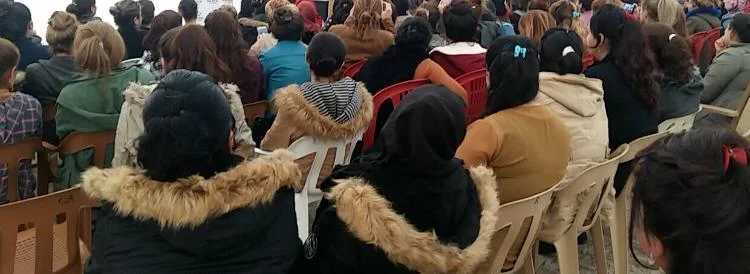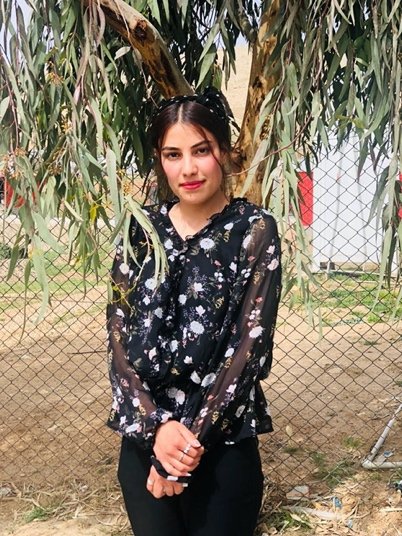Supporting Survivors
Since 2016 we have been working with a team of pro-bono international lawyers at Hogan Lovells to pursue civil litigation cases for women ISIS survivors. The move is aimed at finally bringing Islamic State fighters to justice, while delivering compensation to female Yazidi survivors in northern Iraq.
Since 2016 we have been working with a team of pro-bono international lawyers at Hogan Lovells to pursue civil litigation cases for women ISIS survivors. The move is aimed at finally bringing Islamic State fighters to justice, while delivering compensation to female Yazidi survivors in northern Iraq. Rather than the duty falling on the tax-payer, we believe one solution is for states and governments to confiscate seized or sanctioned assets from foreign ISIS fighters, and redistribute these among the victims. The action is focusing on ‘homegrown’ ISIS fighters – identified by the women victims – from western countries including Australia.
Not only is reparation and redress the most appropriate outcome for identified foreign ISIS fighters, but we believe it will open new doors for the survivors – many of whom feel they have been abandoned by the western world. Holding their aggressors to account in this way will bring them a vital sense of closure at long last.
The civil action is to focus on ‘home-grown’ ISIS perpetrators from western countries who have committed atrocities such as rape, enslavement, torture and human trafficking. We are hoping this will pave way for new policy and legislation for all victims of sexual abuse in conflict.
Positive Masculinity
Although we primarily support women and girls, we fundamentally believe that men and boys must be involved in advancing gender equality and bringing change for everyone. In recent months, we have been running positive masculinity workshops for men and boys, which are aimed at raising awareness and shifting traditional perceptions around women’s roles in society, and helping end harmful behaviours against them.
Although we primarily support women and girls, we fundamentally believe that men and boys must be involved in advancing gender equality and bringing change for everyone. In recent months, we have been running positive masculinity workshops for men and boys, which are aimed at raising awareness and shifting traditional perceptions around women’s roles in society, and helping end harmful behaviours against them.
The sessions are designed to celebrate the positive aspects of being male, and show that masculinity can be empowering rather than restrictive or abusive. The participants work together to learn how they can support women and girls, and cooperate much more fully to improve their lives and those of their families.
Workshops are especially focused on eliminating gender-based violence, while other topics explored include ideas around ‘masculinity’ and what it means to be a modern-day man. The sessions have received a hugely positive response from the men and boys taking part so far, with many productive discussions.
CASE STUDY
Fuad is a 24-year-old Yazidi IDP, who found he was able to re-evaluate and further his own domestic responsibilities after our Positive Masculinity workshops. “Now I help my family with things like cooking and cleaning,” he says. “And I feel better when I talk to them about problems.”
Gender-based Violence Awareness
We run regular awareness sessions to help combat gender-based violence, as well as sexual and domestic violence. This is carried out in group settings as well as through door-to-door community visits.
We run regular awareness sessions to help combat gender-based violence, as well as sexual and domestic violence. This is carried out in group settings as well as through door-to-door community visits.
In collaboration with our trusted partners, SEZ and the Federal State of Baden-Württemberg in southwest Germany, we also ran a four-month PSEA (Prevention of Sexual Exploitation and Abuse) project at our three centres at Domiz 2, Essyan and Rwanga camps, which aimed to raise awareness of abuse and improve reporting mechanisms for victims. As part of the initiative, we also conducted PSEA workshops for government institution employees in Duhok.
These kinds of interventions are badly needed, as shown in an assessment of awareness we conducted, which found that 76% of respondents had no idea what Sexual Exploitation and Abuse (SEA) was. In addition, 63% said they believed cases had increased during the pandemic, largely due to isolation, job losses and a critical shortage of resources. But in spite of rising cases, SEA remains desperately under-reported due to fear of stigmatisation and rejection by family and the wider community. There is also a lack of legal support to enable recriminations.
Our vital awareness work also engages men and boys, in order to help change traditional social norms that contribute to SEA.
CASE STUDY
Surian has been living at Essyan camp since 2014, and was badly affected by the ISIS conflict. She has been attending our awareness sessions on gender-based violence and says: “I now know more about my rights, and my obligations as a female to reduce gender-based violence against other women within my community.”





